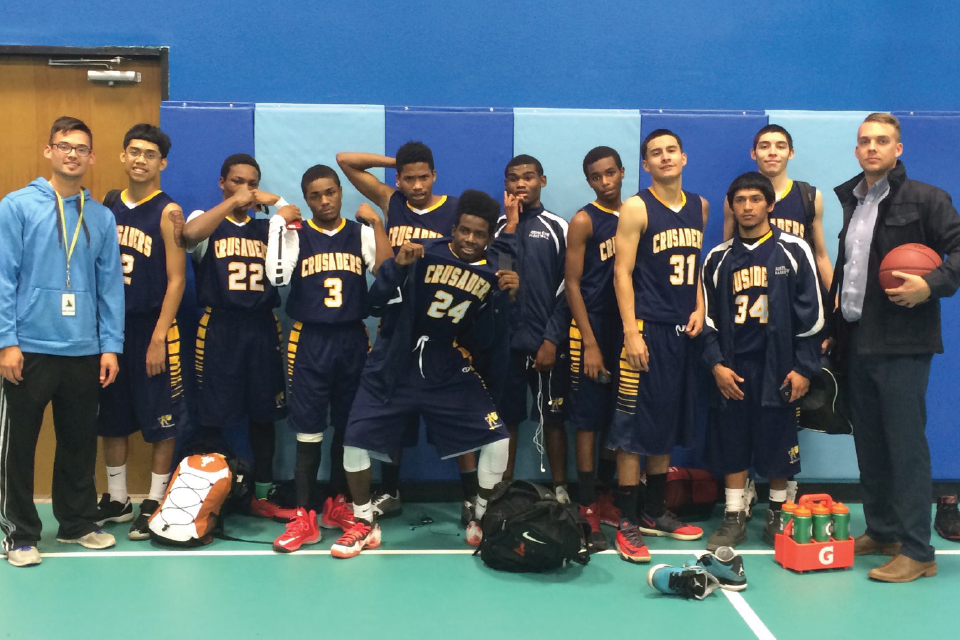Austin Can

Bryan Townsend takes a sip of his drink and eyes my voice recorder nervously. He’ll do just about anything to pretend he isn’t being interviewed. It’s obvious he doesn’t crave the spotlight or like the sound of his own voice—a surprising trait for a man who commands the attention of dozens of teenagers every day.
Townsend is a ninth grade english teacher and head basketball coach at the Austin Can Academy, a charter school for at-risk youth whose overwhelmingly difficult circumstances at home have led to their leaving the traditional public school setting. This school—one of 11 Can Academies statewide—provides second chances to its predominantly African-American and Latino student body through an accelerated and alternative curriculum.
“We take in kids who have been kicked out, dropped out, or had to take a break from school for reasons ranging from legal issues and absent parents to having children of their own,” Townsend explains. Oftentimes, their potential is overshadowed by the challenges they’re facing outside of school.
To appreciate this program, you need to understand how razor-thin the margin of error is for its participants. “Many students don’t have supportive households to return to, so we try to provide them with an opportunity to flourish,” Townsend says. “They’ve had a lot of people let them down, which has deprived them of guidance and more importantly, opportunity.”
Most of his players lack a support structure and struggle to meet societal standards. “So much of success in life revolves around selflessness. But these kids have had to look out for their own and fight for everything they’ve ever gotten,” Townsend reflects. “By design, that goes against everything you try to accomplish as a coach.”
To overcome this survivalist mindset, Townsend has to soften the hard exteriors his players put up. “Their anger is a shield you have to break down to reach them,” he says. “This is easier said than done, especially if you’ve never seen the things these kids have.”
Townsend admits he’s been shocked by the stories his players have told him. He didn’t grow up in a tough neighborhood or without a parent. Instead, he was born and raised in Indianapolis by loving parents and grandparents, something many of his players have never known. “I’ve always kept this in mind. Extenuating circumstances occur in these kids’ lives on a daily basis, to the point that they’re completely numb to it,” he says. “Their resilience is unlike anything I’ve ever seen.”
Despite their differences, Townsend and his players share an important passion: basketball. The team, aptly named the Crusaders, breaks barriers that are otherwise divisive. “It’s the great equalizer. We’re all ball players when we step on the court together, which allows us to speak a common language and block out all the distractions life can bring,” he smiles. “Once I’ve earned their respect in that venue, they allow me to approach them as an teacher, coach, and mentor.”
But Townsend isn’t naïve. The reality that he’s not just competing with other teams, but against deeply ingrained economic, social, and racial issues isn’t lost on him; that is why his mission is to create a family atmosphere in which confidence can be built and success is bred. Although he personalizes his approach for each player, Townsend sets goals—such as a 3.0 team-wide GPA—to provide structure and create a culture of accountability. Thanks to this, over 50 players have graduated during his tenure—no small feat given the circumstances.
And yet, the Crusaders have accomplished plenty on the court over the years, including a Final Four-run in the Texas Charter School State Playoffs in 2012. Still, Townsend insists that his coaching merit is not measured by wins and losses but by opportunities created for his players.
As always, Townsend has high expectations for the Crusaders this season. But regardless of their record, he knows countless memories will be made, friendships formed, and lessons learned. “Maybe I have a small impact on their lives, maybe I don’t at all. Simply witnessing these kids’ lives take shape in a positive way is something I’ll never forget,” he says. “Ultimately, you just hope they remember the smiles, the laughter and the bonding moments.”






